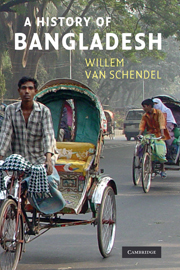Book contents
- Frontmatter
- Contents
- List of plates
- List of maps and figures
- Acknowledgements
- Timeline
- Introduction
- PART I THE LONG VIEW
- PART II COLONIAL ENCOUNTERS
- PART III BECOMING EAST PAKISTAN
- PART IV WAR AND THE BIRTH OF BANGLADESH
- 16 Armed conflict
- 17 A state is born
- 18 Imagining a new society
- PART V INDEPENDENT BANGLADESH
- Conclusion
- Bangladesh district maps
- Key political figures since 1947
- Glossary of Bengali terms
- Notes
- Bibliography
- Index
18 - Imagining a new society
Published online by Cambridge University Press: 05 February 2015
- Frontmatter
- Contents
- List of plates
- List of maps and figures
- Acknowledgements
- Timeline
- Introduction
- PART I THE LONG VIEW
- PART II COLONIAL ENCOUNTERS
- PART III BECOMING EAST PAKISTAN
- PART IV WAR AND THE BIRTH OF BANGLADESH
- 16 Armed conflict
- 17 A state is born
- 18 Imagining a new society
- PART V INDEPENDENT BANGLADESH
- Conclusion
- Bangladesh district maps
- Key political figures since 1947
- Glossary of Bengali terms
- Notes
- Bibliography
- Index
Summary
The immediate postwar period was a time of national jubilation. In 1972 and 1973 anything seemed possible. The nation had finally won its own state and could now design its own future. The mood was oddly reminiscent of that other moment of euphoria, twenty-five years earlier, when the people of the Bengal delta had joined the Pakistani nation. Then, too, the future had looked bright, and there had been high hopes that the disappearance of detested overlords would usher in a social revolution.
But there was a crucial difference between the two moments. In the late 1940s it was an Islamic vision that had fuelled the sense of nation. The people of the delta were joining other Muslims of South Asia to create the homeland of Pakistan. Muslims first and Bengalis next, they imagined the future society as being in accordance with an Islamic sense of order and justice, adapted to local conditions. By contrast, the national identity that animated them in the early 1970s was a regional one. They were Bengalis first and Muslims next. The new society should be ordered in accordance with principles that had been developed in the West and could be adapted to local circumstances: democracy, socialism and secularism. Islam was important as part of the majority culture and as a matter of personal faith, but it was not part of national identity. Within twenty-five years, they had moved from an image of themselves as Bengali Muslims to one of themselves as Muslim Bengalis.
- Type
- Chapter
- Information
- A History of Bangladesh , pp. 183 - 190Publisher: Cambridge University PressPrint publication year: 2009



